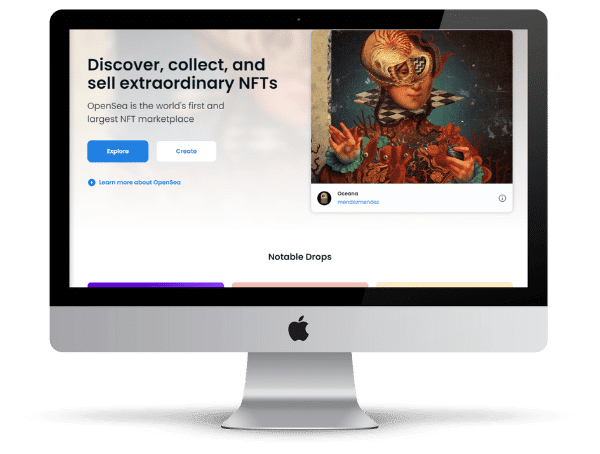Making money in the metaverse
Opportunities and Possibilities
The metaverse, a virtual world in which people move through immersive technologies such as virtual and augmented reality, is increasingly becoming a place for social interactions, entertainment, and even economic activities.
As the metaverse’s influence grows, so do numerous opportunities to make money. In this blog article, we’ll take a look at different ways to generate income in the metaverse.
Virtual Real Estate Trading
Similar to real life, you can get into virtual real estate trading in the metaverse. Platforms such as Decentraland and Somnium Space allow users to buy, design, and sell plots of land.
Due to the increasing value of unique virtual locations, investment opportunities are opening up here to be able to make long-term profits.
Investment opportunities
Similar to the real estate market, investors can purchase land in the metaverse in the hope that its value will increase over time. Unique and well-located plots can be particularly sought after and generate high returns.
Development of real estate
Users can develop their virtual plots by creating buildings, artwork, entertainment venues, or even commercial projects on them. Through creative and attractive design, they can increase the attractiveness of their properties.
Events & Monetization
Owners of virtual plots can organize events, concerts, or exhibitions to attract visitors. By selling tickets, advertising, and sponsorships, they can generate revenue and commercially exploit their virtual properties.
Risks and Challenges
As with any investment, there are risks in the virtual real estate market. Changes in technology, changes in user demand, and even security concerns can affect the value of virtual land.
Digital art and NFTs
The popularity of non-fungible tokens (NFTs) has revolutionized the art scene, and the metaverse provides an ideal platform for digital artists. By selling their artwork as NFTs, artists can gain direct access to a global digital art community and earn income from the sale of their works.
Tokenization of artworks
Platforms like OpenSea, Rarible, and Mintable allow artists to sell their artwork as NFTs. These platforms provide a decentralized marketplace infrastructure where digital artworks can be traded. This creates a direct link between artists and collectors without the involvement of middlemen.
Royalties and resales
An innovative aspect of NFTs is the ability for artists to continuously profit from their works. Each time the NFT is resold on the secondary market, artists can automatically receive a predefined percentage fee, often referred to as a royalty. This creates a long-term source of income for artists, even if their works change hands several times.

Virtual Services
By creating virtual services, users can make money in the metaverse.
This ranges from organizing events and concerts to creating bespoke avatar designs. Virtual services can cover a wide range of skills and provide a flexible way to generate income.
Examples:
Event Management
Users can organize events and concerts in the metaverse. These can be cultural events, educational courses, networking events, or even virtual weddings. Organizing events requires creative ideas and the ability to optimally design virtual spaces to create an engaging experience for attendees.
- Example: A metaverse event manager could organize a virtual concert series for emerging artists and generate revenue by selling virtual tickets.
Avatar design and personalization
Creating custom avatars is a sought-after service in the metaverse. Users want to customize their virtual identities, whether it’s for social interactions, business meetings, or gaming.
- Example: An avatar designer could specialize in creating unique virtual identities and offer their services through platforms where users can personalize their avatars.
E-commerce in the metaverse
More and more companies are recognizing the potential of the metaverse for e-commerce. Virtual reality (VR) enables immersive shopping experiences where users can explore and purchase digital products in a virtual environment.
Selling virtual goods and services in the metaverse provides an additional source of income.
Immersive shopping experiences
By integrating virtual reality (VR), e-commerce platforms in the metaverse can create unique and immersive shopping experiences. Users can explore virtual stores, view products in 3D, and move around in an engaging virtual environment.
- Example: A fashion company could create a virtual boutique where users can select, try on, and buy garments using their avatars.
Interactive product presentations
Companies can create interactive presentations of their products in the metaverse. This allows users to inspect products more closely, test features, and get comprehensive information before making a purchase decision.
- Example: An electronics manufacturer could create a virtual environment where users can try out and compare the latest gadgets before actually buying them.
Gaming and eSports
The gaming sector is already firmly entrenched in the metaverse. Players can earn real money by selling in-game assets, skins, and virtual currencies. Similarly, eSports events are gaining traction in the metaverse, and talented players can earn money through competitions and sponsorships.
In-Game Assets and Skins
Origin and Tokenization: In-game assets, such as virtual clothing, weapons, or vehicles, can be tokenized as NFTs. These tokens represent unique digital objects that players can buy, sell, and trade. The use of blockchain technology ensures the authenticity and rarity of these in-game items.
Economic significance: Players can earn real money by selling or trading in-game assets. Particularly rare or sought-after items can have a higher value in the market, creating an economy within the game.
Example: In a virtual multiplayer role-playing game, a player could own a rare armor as an NFT and sell it to another player who is willing to pay a high price for the uniqueness of the digital item.
Virtual Currencies and In-Game Economy
Cryptocurrency Integration: Some games use cryptocurrencies as the primary means of payment for in-game transactions. This allows for a seamless exchange of virtual goods and services between players.
In-Game Economy: Through the use of virtual currencies, players can not only purchase in-game items, but also services from other players, such as making custom skins or offering in-game services.
Example: In a massively multiplayer online game (MMOG), players could use their own currency to facilitate trade with each other and boost the game economy.
eSports Events & Competitions
Tournaments in the metaverse: eSports tournaments in the metaverse are gaining popularity as they make it possible to take competitions to a new level. Players can participate in tournaments as avatars, and spectators can watch the events in virtual stadiums or arenas.
Cash Prizes and Sponsorships: Successful players can win cash prizes by participating in eSports competitions. It also opens up opportunities for sponsorship by companies that want to promote their products or services in the metaverse.
Example: An eSports team could compete in a virtual competition and, through victories, receive cash prizes as well as sponsorship money from companies that want to showcase their products in the metaverse.
Virtual Sports Betting
Crypto Betting Integration: Platforms in the metaverse enable virtual sports betting, where players can use cryptocurrencies to bet on eSports events or in-game competitions.
Emergence of betting platforms: Dedicated platforms offer the opportunity to bet on the outcome of virtual sporting events, with smart contracts and blockchain technology ensuring fairness and transparency.
Example: A user could bet cryptocurrencies on the outcome of a virtual football match or an eSports tournament and make a profit if predicted correctly.

